Sociology 1: Education, Training, and Policy Analysis Report
VerifiedAdded on 2022/10/19
|16
|4673
|233
Report
AI Summary
This sociology report delves into the multifaceted aspects of education and training, examining the significance of professionalism and dual professionalism within the sector. It explores how professional values influence practice, the impact of various factors—social, political, and economic—on educational policies, and the role of policies, codes of practice, and guidelines in organizations. The report further analyzes the roles of stakeholders and external bodies in education and training, including their impacts and the accountability they hold. It emphasizes the importance of partnerships with employers and other stakeholders and concludes with an overview of current educational policies on curriculum and practices within a specific area of specialization, highlighting the influence of social and political factors. The report provides a comprehensive understanding of the educational landscape, emphasizing the interconnectedness of various elements.
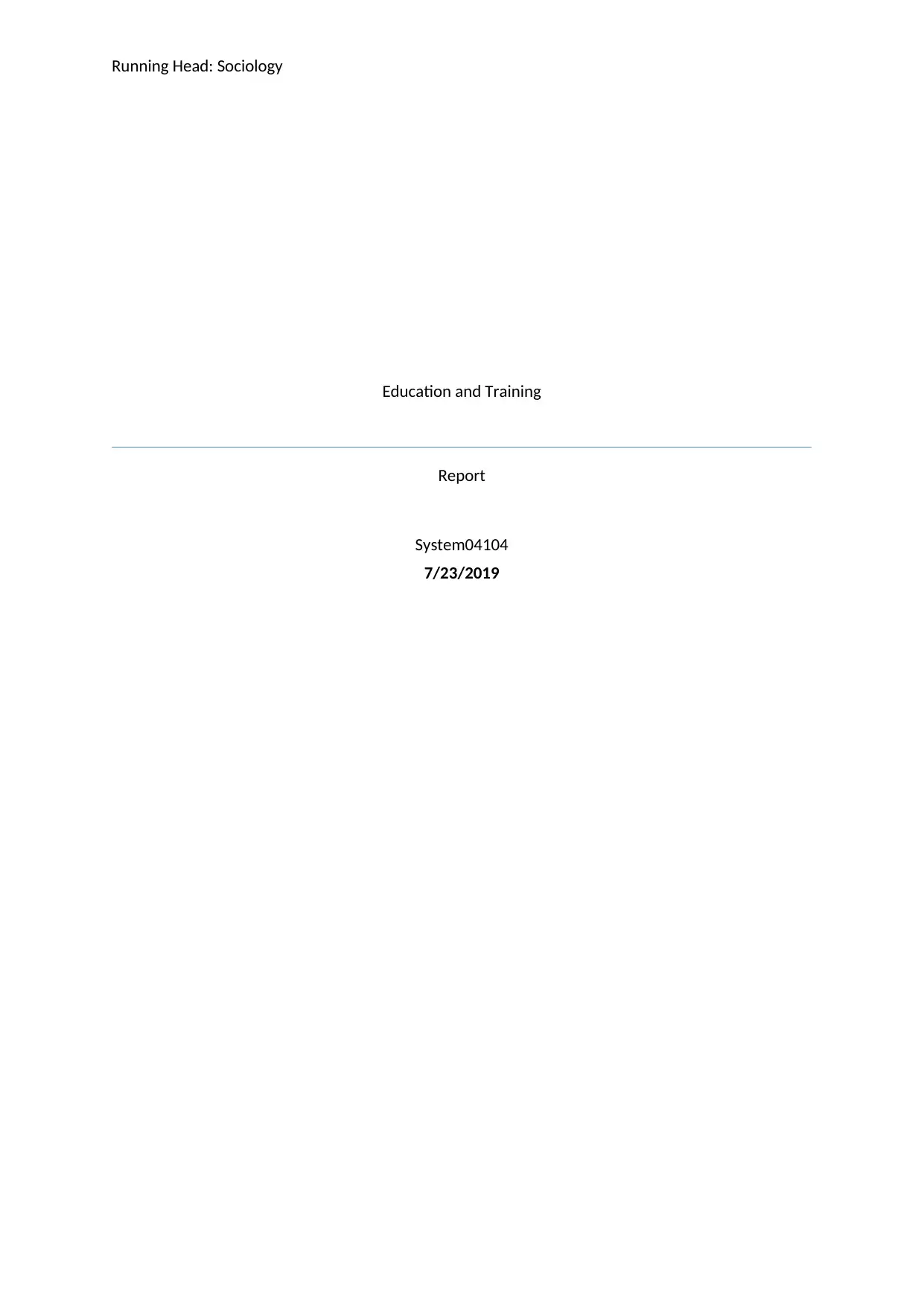
Running Head: Sociology
Education and Training
Report
System04104
7/23/2019
Education and Training
Report
System04104
7/23/2019
Paraphrase This Document
Need a fresh take? Get an instant paraphrase of this document with our AI Paraphraser
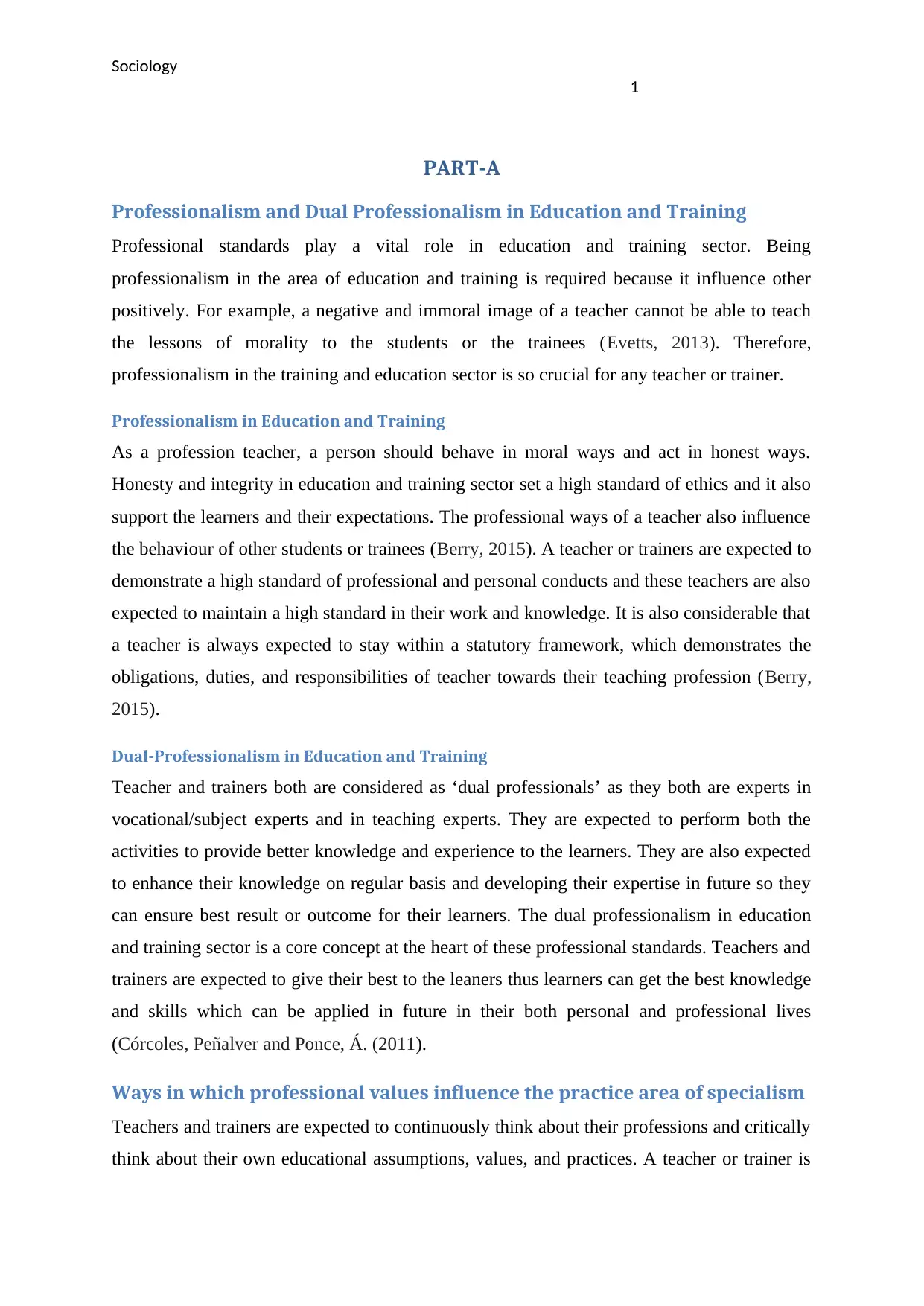
Sociology
1
PART-A
Professionalism and Dual Professionalism in Education and Training
Professional standards play a vital role in education and training sector. Being
professionalism in the area of education and training is required because it influence other
positively. For example, a negative and immoral image of a teacher cannot be able to teach
the lessons of morality to the students or the trainees (Evetts, 2013). Therefore,
professionalism in the training and education sector is so crucial for any teacher or trainer.
Professionalism in Education and Training
As a profession teacher, a person should behave in moral ways and act in honest ways.
Honesty and integrity in education and training sector set a high standard of ethics and it also
support the learners and their expectations. The professional ways of a teacher also influence
the behaviour of other students or trainees (Berry, 2015). A teacher or trainers are expected to
demonstrate a high standard of professional and personal conducts and these teachers are also
expected to maintain a high standard in their work and knowledge. It is also considerable that
a teacher is always expected to stay within a statutory framework, which demonstrates the
obligations, duties, and responsibilities of teacher towards their teaching profession (Berry,
2015).
Dual-Professionalism in Education and Training
Teacher and trainers both are considered as ‘dual professionals’ as they both are experts in
vocational/subject experts and in teaching experts. They are expected to perform both the
activities to provide better knowledge and experience to the learners. They are also expected
to enhance their knowledge on regular basis and developing their expertise in future so they
can ensure best result or outcome for their learners. The dual professionalism in education
and training sector is a core concept at the heart of these professional standards. Teachers and
trainers are expected to give their best to the leaners thus learners can get the best knowledge
and skills which can be applied in future in their both personal and professional lives
(Córcoles, Peñalver and Ponce, Á. (2011).
Ways in which professional values influence the practice area of specialism
Teachers and trainers are expected to continuously think about their professions and critically
think about their own educational assumptions, values, and practices. A teacher or trainer is
1
PART-A
Professionalism and Dual Professionalism in Education and Training
Professional standards play a vital role in education and training sector. Being
professionalism in the area of education and training is required because it influence other
positively. For example, a negative and immoral image of a teacher cannot be able to teach
the lessons of morality to the students or the trainees (Evetts, 2013). Therefore,
professionalism in the training and education sector is so crucial for any teacher or trainer.
Professionalism in Education and Training
As a profession teacher, a person should behave in moral ways and act in honest ways.
Honesty and integrity in education and training sector set a high standard of ethics and it also
support the learners and their expectations. The professional ways of a teacher also influence
the behaviour of other students or trainees (Berry, 2015). A teacher or trainers are expected to
demonstrate a high standard of professional and personal conducts and these teachers are also
expected to maintain a high standard in their work and knowledge. It is also considerable that
a teacher is always expected to stay within a statutory framework, which demonstrates the
obligations, duties, and responsibilities of teacher towards their teaching profession (Berry,
2015).
Dual-Professionalism in Education and Training
Teacher and trainers both are considered as ‘dual professionals’ as they both are experts in
vocational/subject experts and in teaching experts. They are expected to perform both the
activities to provide better knowledge and experience to the learners. They are also expected
to enhance their knowledge on regular basis and developing their expertise in future so they
can ensure best result or outcome for their learners. The dual professionalism in education
and training sector is a core concept at the heart of these professional standards. Teachers and
trainers are expected to give their best to the leaners thus learners can get the best knowledge
and skills which can be applied in future in their both personal and professional lives
(Córcoles, Peñalver and Ponce, Á. (2011).
Ways in which professional values influence the practice area of specialism
Teachers and trainers are expected to continuously think about their professions and critically
think about their own educational assumptions, values, and practices. A teacher or trainer is
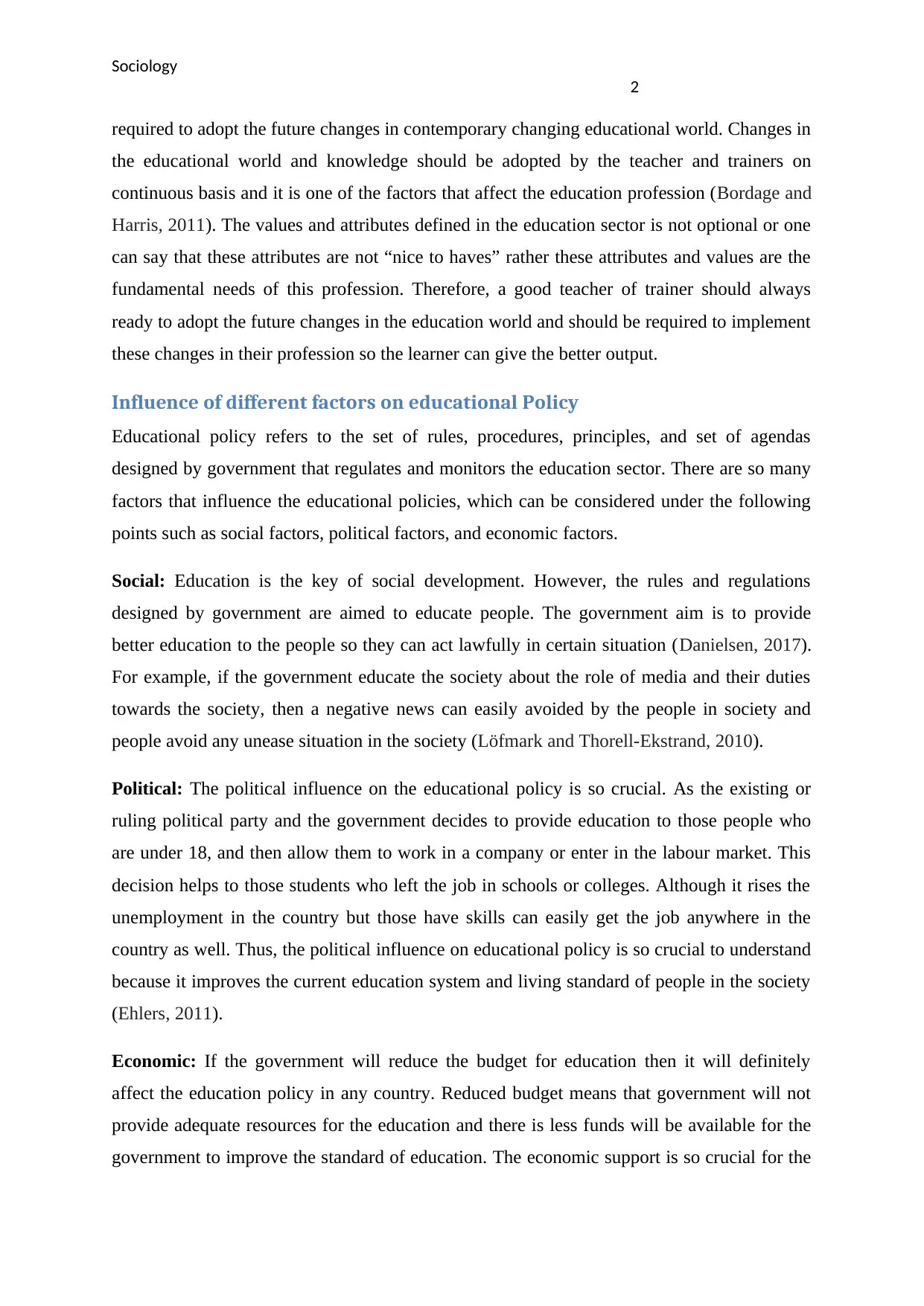
Sociology
2
required to adopt the future changes in contemporary changing educational world. Changes in
the educational world and knowledge should be adopted by the teacher and trainers on
continuous basis and it is one of the factors that affect the education profession (Bordage and
Harris, 2011). The values and attributes defined in the education sector is not optional or one
can say that these attributes are not “nice to haves” rather these attributes and values are the
fundamental needs of this profession. Therefore, a good teacher of trainer should always
ready to adopt the future changes in the education world and should be required to implement
these changes in their profession so the learner can give the better output.
Influence of different factors on educational Policy
Educational policy refers to the set of rules, procedures, principles, and set of agendas
designed by government that regulates and monitors the education sector. There are so many
factors that influence the educational policies, which can be considered under the following
points such as social factors, political factors, and economic factors.
Social: Education is the key of social development. However, the rules and regulations
designed by government are aimed to educate people. The government aim is to provide
better education to the people so they can act lawfully in certain situation (Danielsen, 2017).
For example, if the government educate the society about the role of media and their duties
towards the society, then a negative news can easily avoided by the people in society and
people avoid any unease situation in the society (Löfmark and Thorell-Ekstrand, 2010).
Political: The political influence on the educational policy is so crucial. As the existing or
ruling political party and the government decides to provide education to those people who
are under 18, and then allow them to work in a company or enter in the labour market. This
decision helps to those students who left the job in schools or colleges. Although it rises the
unemployment in the country but those have skills can easily get the job anywhere in the
country as well. Thus, the political influence on educational policy is so crucial to understand
because it improves the current education system and living standard of people in the society
(Ehlers, 2011).
Economic: If the government will reduce the budget for education then it will definitely
affect the education policy in any country. Reduced budget means that government will not
provide adequate resources for the education and there is less funds will be available for the
government to improve the standard of education. The economic support is so crucial for the
2
required to adopt the future changes in contemporary changing educational world. Changes in
the educational world and knowledge should be adopted by the teacher and trainers on
continuous basis and it is one of the factors that affect the education profession (Bordage and
Harris, 2011). The values and attributes defined in the education sector is not optional or one
can say that these attributes are not “nice to haves” rather these attributes and values are the
fundamental needs of this profession. Therefore, a good teacher of trainer should always
ready to adopt the future changes in the education world and should be required to implement
these changes in their profession so the learner can give the better output.
Influence of different factors on educational Policy
Educational policy refers to the set of rules, procedures, principles, and set of agendas
designed by government that regulates and monitors the education sector. There are so many
factors that influence the educational policies, which can be considered under the following
points such as social factors, political factors, and economic factors.
Social: Education is the key of social development. However, the rules and regulations
designed by government are aimed to educate people. The government aim is to provide
better education to the people so they can act lawfully in certain situation (Danielsen, 2017).
For example, if the government educate the society about the role of media and their duties
towards the society, then a negative news can easily avoided by the people in society and
people avoid any unease situation in the society (Löfmark and Thorell-Ekstrand, 2010).
Political: The political influence on the educational policy is so crucial. As the existing or
ruling political party and the government decides to provide education to those people who
are under 18, and then allow them to work in a company or enter in the labour market. This
decision helps to those students who left the job in schools or colleges. Although it rises the
unemployment in the country but those have skills can easily get the job anywhere in the
country as well. Thus, the political influence on educational policy is so crucial to understand
because it improves the current education system and living standard of people in the society
(Ehlers, 2011).
Economic: If the government will reduce the budget for education then it will definitely
affect the education policy in any country. Reduced budget means that government will not
provide adequate resources for the education and there is less funds will be available for the
government to improve the standard of education. The economic support is so crucial for the
⊘ This is a preview!⊘
Do you want full access?
Subscribe today to unlock all pages.

Trusted by 1+ million students worldwide
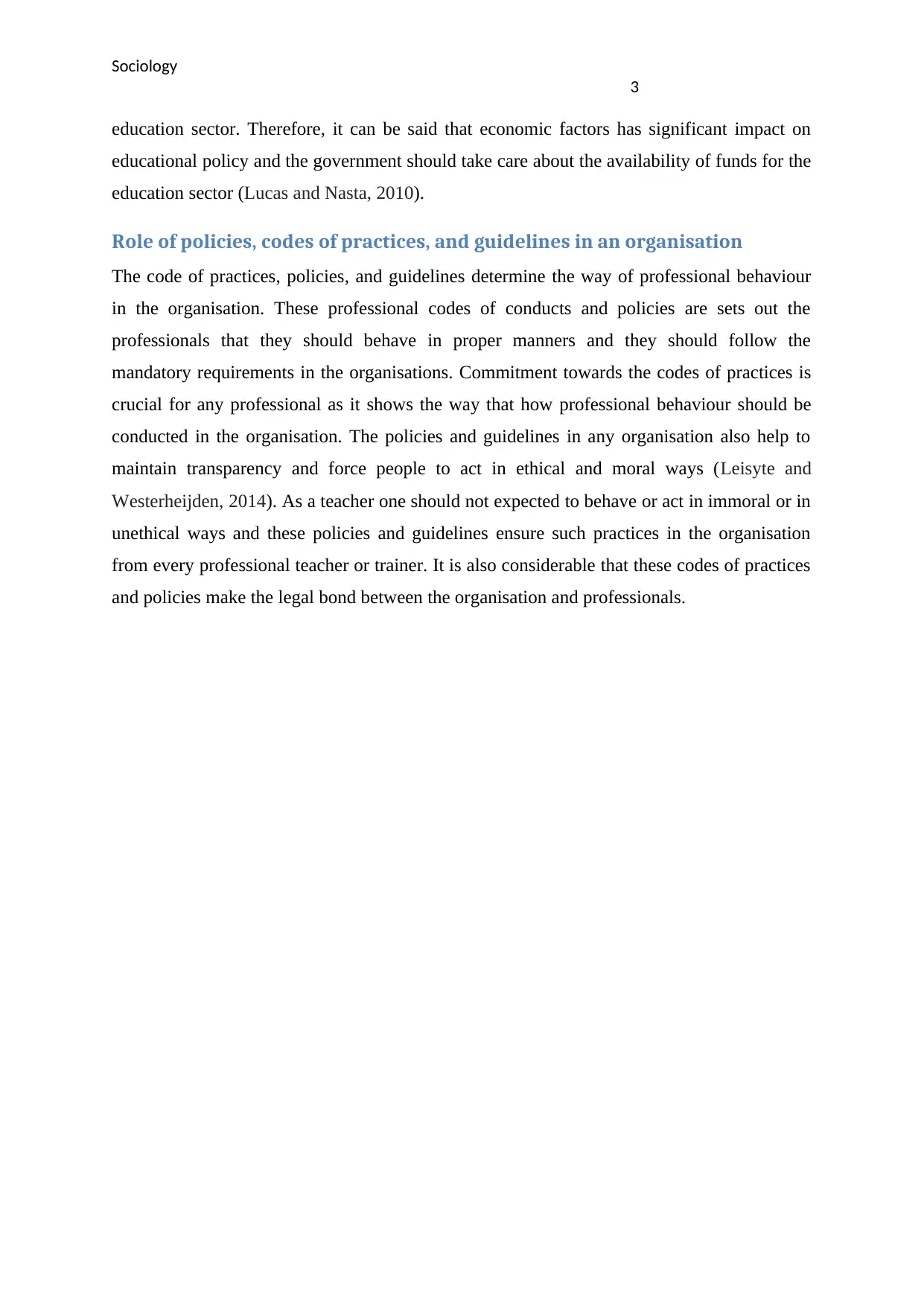
Sociology
3
education sector. Therefore, it can be said that economic factors has significant impact on
educational policy and the government should take care about the availability of funds for the
education sector (Lucas and Nasta, 2010).
Role of policies, codes of practices, and guidelines in an organisation
The code of practices, policies, and guidelines determine the way of professional behaviour
in the organisation. These professional codes of conducts and policies are sets out the
professionals that they should behave in proper manners and they should follow the
mandatory requirements in the organisations. Commitment towards the codes of practices is
crucial for any professional as it shows the way that how professional behaviour should be
conducted in the organisation. The policies and guidelines in any organisation also help to
maintain transparency and force people to act in ethical and moral ways (Leisyte and
Westerheijden, 2014). As a teacher one should not expected to behave or act in immoral or in
unethical ways and these policies and guidelines ensure such practices in the organisation
from every professional teacher or trainer. It is also considerable that these codes of practices
and policies make the legal bond between the organisation and professionals.
3
education sector. Therefore, it can be said that economic factors has significant impact on
educational policy and the government should take care about the availability of funds for the
education sector (Lucas and Nasta, 2010).
Role of policies, codes of practices, and guidelines in an organisation
The code of practices, policies, and guidelines determine the way of professional behaviour
in the organisation. These professional codes of conducts and policies are sets out the
professionals that they should behave in proper manners and they should follow the
mandatory requirements in the organisations. Commitment towards the codes of practices is
crucial for any professional as it shows the way that how professional behaviour should be
conducted in the organisation. The policies and guidelines in any organisation also help to
maintain transparency and force people to act in ethical and moral ways (Leisyte and
Westerheijden, 2014). As a teacher one should not expected to behave or act in immoral or in
unethical ways and these policies and guidelines ensure such practices in the organisation
from every professional teacher or trainer. It is also considerable that these codes of practices
and policies make the legal bond between the organisation and professionals.
Paraphrase This Document
Need a fresh take? Get an instant paraphrase of this document with our AI Paraphraser
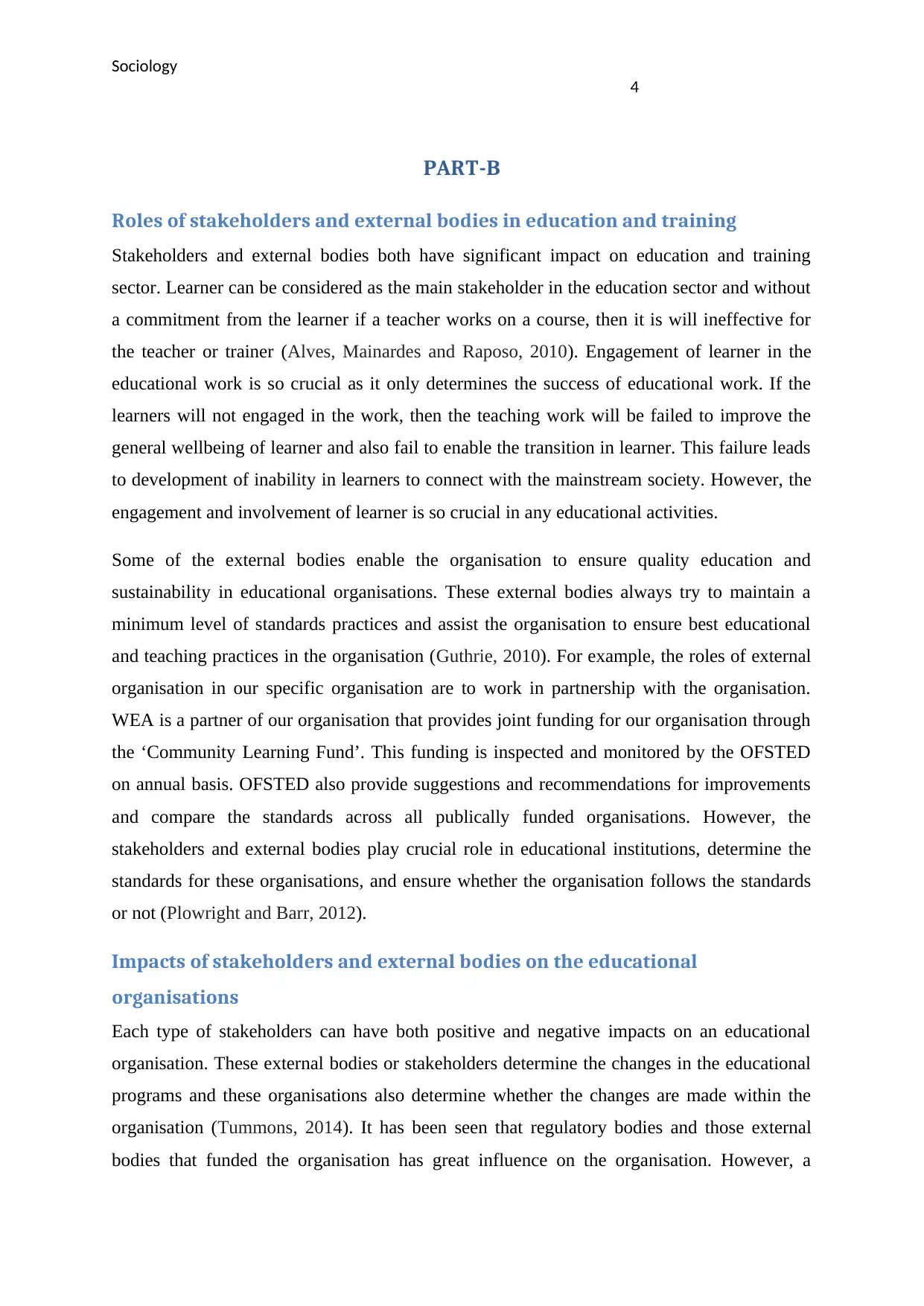
Sociology
4
PART-B
Roles of stakeholders and external bodies in education and training
Stakeholders and external bodies both have significant impact on education and training
sector. Learner can be considered as the main stakeholder in the education sector and without
a commitment from the learner if a teacher works on a course, then it is will ineffective for
the teacher or trainer (Alves, Mainardes and Raposo, 2010). Engagement of learner in the
educational work is so crucial as it only determines the success of educational work. If the
learners will not engaged in the work, then the teaching work will be failed to improve the
general wellbeing of learner and also fail to enable the transition in learner. This failure leads
to development of inability in learners to connect with the mainstream society. However, the
engagement and involvement of learner is so crucial in any educational activities.
Some of the external bodies enable the organisation to ensure quality education and
sustainability in educational organisations. These external bodies always try to maintain a
minimum level of standards practices and assist the organisation to ensure best educational
and teaching practices in the organisation (Guthrie, 2010). For example, the roles of external
organisation in our specific organisation are to work in partnership with the organisation.
WEA is a partner of our organisation that provides joint funding for our organisation through
the ‘Community Learning Fund’. This funding is inspected and monitored by the OFSTED
on annual basis. OFSTED also provide suggestions and recommendations for improvements
and compare the standards across all publically funded organisations. However, the
stakeholders and external bodies play crucial role in educational institutions, determine the
standards for these organisations, and ensure whether the organisation follows the standards
or not (Plowright and Barr, 2012).
Impacts of stakeholders and external bodies on the educational
organisations
Each type of stakeholders can have both positive and negative impacts on an educational
organisation. These external bodies or stakeholders determine the changes in the educational
programs and these organisations also determine whether the changes are made within the
organisation (Tummons, 2014). It has been seen that regulatory bodies and those external
bodies that funded the organisation has great influence on the organisation. However, a
4
PART-B
Roles of stakeholders and external bodies in education and training
Stakeholders and external bodies both have significant impact on education and training
sector. Learner can be considered as the main stakeholder in the education sector and without
a commitment from the learner if a teacher works on a course, then it is will ineffective for
the teacher or trainer (Alves, Mainardes and Raposo, 2010). Engagement of learner in the
educational work is so crucial as it only determines the success of educational work. If the
learners will not engaged in the work, then the teaching work will be failed to improve the
general wellbeing of learner and also fail to enable the transition in learner. This failure leads
to development of inability in learners to connect with the mainstream society. However, the
engagement and involvement of learner is so crucial in any educational activities.
Some of the external bodies enable the organisation to ensure quality education and
sustainability in educational organisations. These external bodies always try to maintain a
minimum level of standards practices and assist the organisation to ensure best educational
and teaching practices in the organisation (Guthrie, 2010). For example, the roles of external
organisation in our specific organisation are to work in partnership with the organisation.
WEA is a partner of our organisation that provides joint funding for our organisation through
the ‘Community Learning Fund’. This funding is inspected and monitored by the OFSTED
on annual basis. OFSTED also provide suggestions and recommendations for improvements
and compare the standards across all publically funded organisations. However, the
stakeholders and external bodies play crucial role in educational institutions, determine the
standards for these organisations, and ensure whether the organisation follows the standards
or not (Plowright and Barr, 2012).
Impacts of stakeholders and external bodies on the educational
organisations
Each type of stakeholders can have both positive and negative impacts on an educational
organisation. These external bodies or stakeholders determine the changes in the educational
programs and these organisations also determine whether the changes are made within the
organisation (Tummons, 2014). It has been seen that regulatory bodies and those external
bodies that funded the organisation has great influence on the organisation. However, a
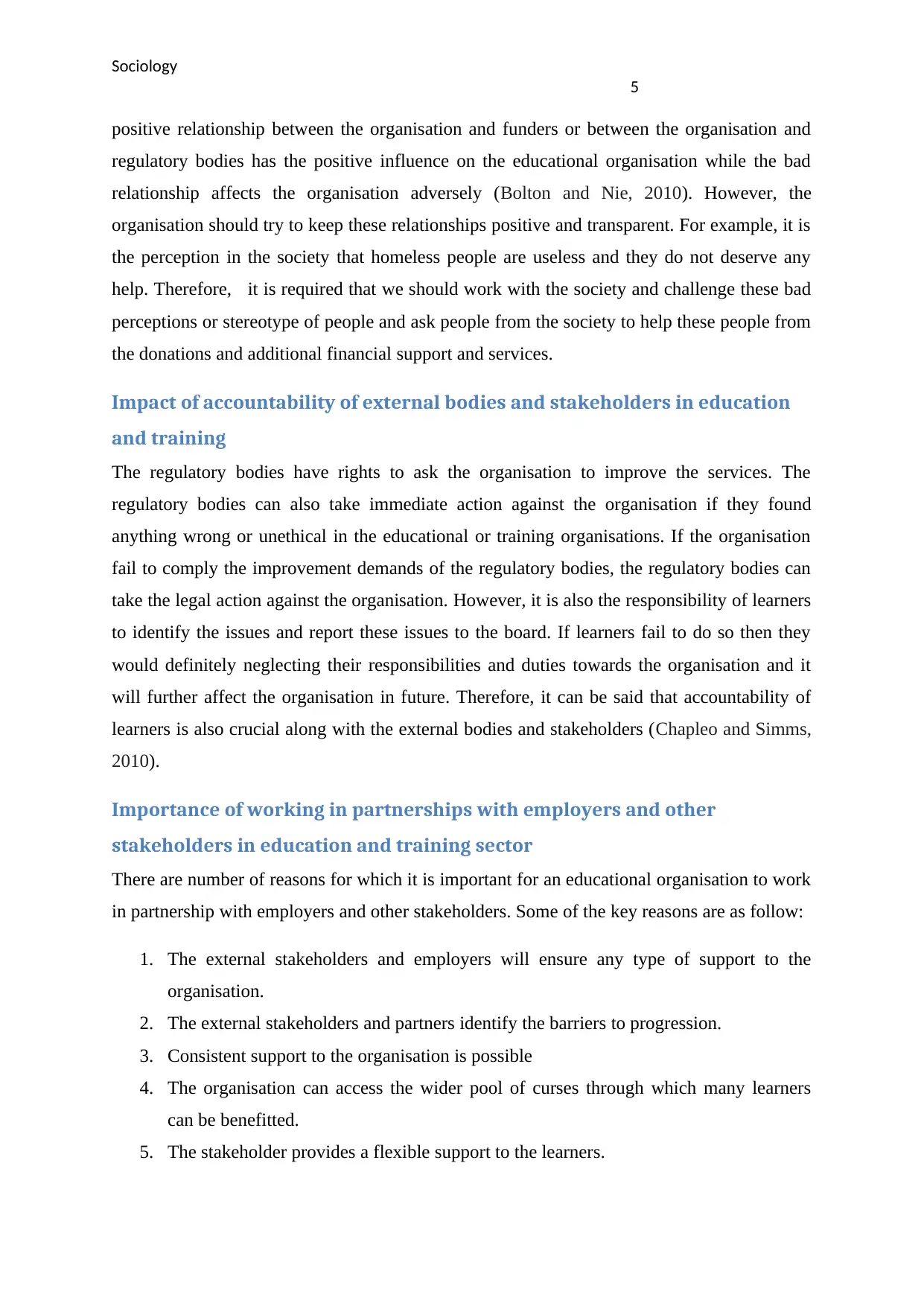
Sociology
5
positive relationship between the organisation and funders or between the organisation and
regulatory bodies has the positive influence on the educational organisation while the bad
relationship affects the organisation adversely (Bolton and Nie, 2010). However, the
organisation should try to keep these relationships positive and transparent. For example, it is
the perception in the society that homeless people are useless and they do not deserve any
help. Therefore, it is required that we should work with the society and challenge these bad
perceptions or stereotype of people and ask people from the society to help these people from
the donations and additional financial support and services.
Impact of accountability of external bodies and stakeholders in education
and training
The regulatory bodies have rights to ask the organisation to improve the services. The
regulatory bodies can also take immediate action against the organisation if they found
anything wrong or unethical in the educational or training organisations. If the organisation
fail to comply the improvement demands of the regulatory bodies, the regulatory bodies can
take the legal action against the organisation. However, it is also the responsibility of learners
to identify the issues and report these issues to the board. If learners fail to do so then they
would definitely neglecting their responsibilities and duties towards the organisation and it
will further affect the organisation in future. Therefore, it can be said that accountability of
learners is also crucial along with the external bodies and stakeholders (Chapleo and Simms,
2010).
Importance of working in partnerships with employers and other
stakeholders in education and training sector
There are number of reasons for which it is important for an educational organisation to work
in partnership with employers and other stakeholders. Some of the key reasons are as follow:
1. The external stakeholders and employers will ensure any type of support to the
organisation.
2. The external stakeholders and partners identify the barriers to progression.
3. Consistent support to the organisation is possible
4. The organisation can access the wider pool of curses through which many learners
can be benefitted.
5. The stakeholder provides a flexible support to the learners.
5
positive relationship between the organisation and funders or between the organisation and
regulatory bodies has the positive influence on the educational organisation while the bad
relationship affects the organisation adversely (Bolton and Nie, 2010). However, the
organisation should try to keep these relationships positive and transparent. For example, it is
the perception in the society that homeless people are useless and they do not deserve any
help. Therefore, it is required that we should work with the society and challenge these bad
perceptions or stereotype of people and ask people from the society to help these people from
the donations and additional financial support and services.
Impact of accountability of external bodies and stakeholders in education
and training
The regulatory bodies have rights to ask the organisation to improve the services. The
regulatory bodies can also take immediate action against the organisation if they found
anything wrong or unethical in the educational or training organisations. If the organisation
fail to comply the improvement demands of the regulatory bodies, the regulatory bodies can
take the legal action against the organisation. However, it is also the responsibility of learners
to identify the issues and report these issues to the board. If learners fail to do so then they
would definitely neglecting their responsibilities and duties towards the organisation and it
will further affect the organisation in future. Therefore, it can be said that accountability of
learners is also crucial along with the external bodies and stakeholders (Chapleo and Simms,
2010).
Importance of working in partnerships with employers and other
stakeholders in education and training sector
There are number of reasons for which it is important for an educational organisation to work
in partnership with employers and other stakeholders. Some of the key reasons are as follow:
1. The external stakeholders and employers will ensure any type of support to the
organisation.
2. The external stakeholders and partners identify the barriers to progression.
3. Consistent support to the organisation is possible
4. The organisation can access the wider pool of curses through which many learners
can be benefitted.
5. The stakeholder provides a flexible support to the learners.
⊘ This is a preview!⊘
Do you want full access?
Subscribe today to unlock all pages.

Trusted by 1+ million students worldwide
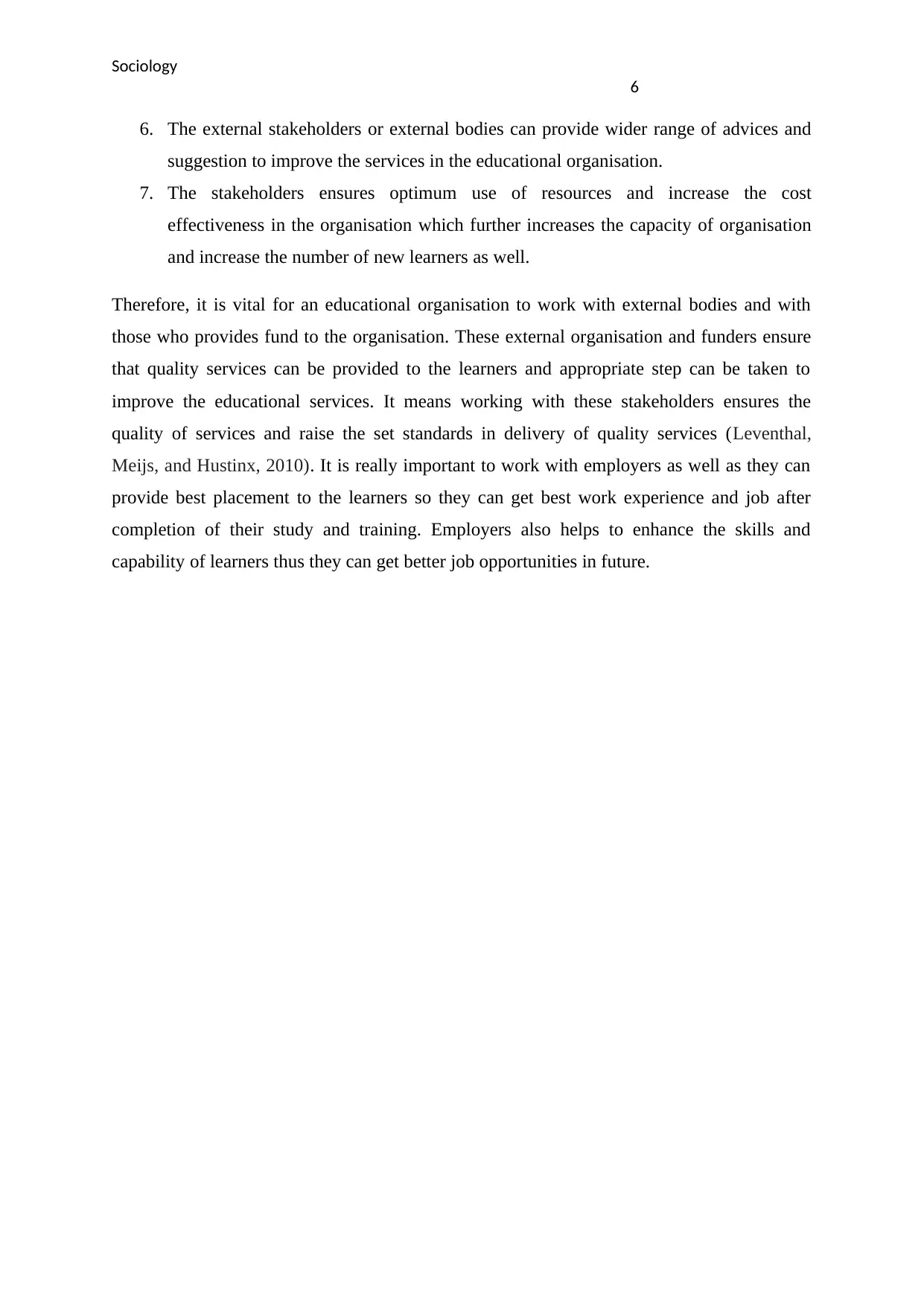
Sociology
6
6. The external stakeholders or external bodies can provide wider range of advices and
suggestion to improve the services in the educational organisation.
7. The stakeholders ensures optimum use of resources and increase the cost
effectiveness in the organisation which further increases the capacity of organisation
and increase the number of new learners as well.
Therefore, it is vital for an educational organisation to work with external bodies and with
those who provides fund to the organisation. These external organisation and funders ensure
that quality services can be provided to the learners and appropriate step can be taken to
improve the educational services. It means working with these stakeholders ensures the
quality of services and raise the set standards in delivery of quality services (Leventhal,
Meijs, and Hustinx, 2010). It is really important to work with employers as well as they can
provide best placement to the learners so they can get best work experience and job after
completion of their study and training. Employers also helps to enhance the skills and
capability of learners thus they can get better job opportunities in future.
6
6. The external stakeholders or external bodies can provide wider range of advices and
suggestion to improve the services in the educational organisation.
7. The stakeholders ensures optimum use of resources and increase the cost
effectiveness in the organisation which further increases the capacity of organisation
and increase the number of new learners as well.
Therefore, it is vital for an educational organisation to work with external bodies and with
those who provides fund to the organisation. These external organisation and funders ensure
that quality services can be provided to the learners and appropriate step can be taken to
improve the educational services. It means working with these stakeholders ensures the
quality of services and raise the set standards in delivery of quality services (Leventhal,
Meijs, and Hustinx, 2010). It is really important to work with employers as well as they can
provide best placement to the learners so they can get best work experience and job after
completion of their study and training. Employers also helps to enhance the skills and
capability of learners thus they can get better job opportunities in future.
Paraphrase This Document
Need a fresh take? Get an instant paraphrase of this document with our AI Paraphraser
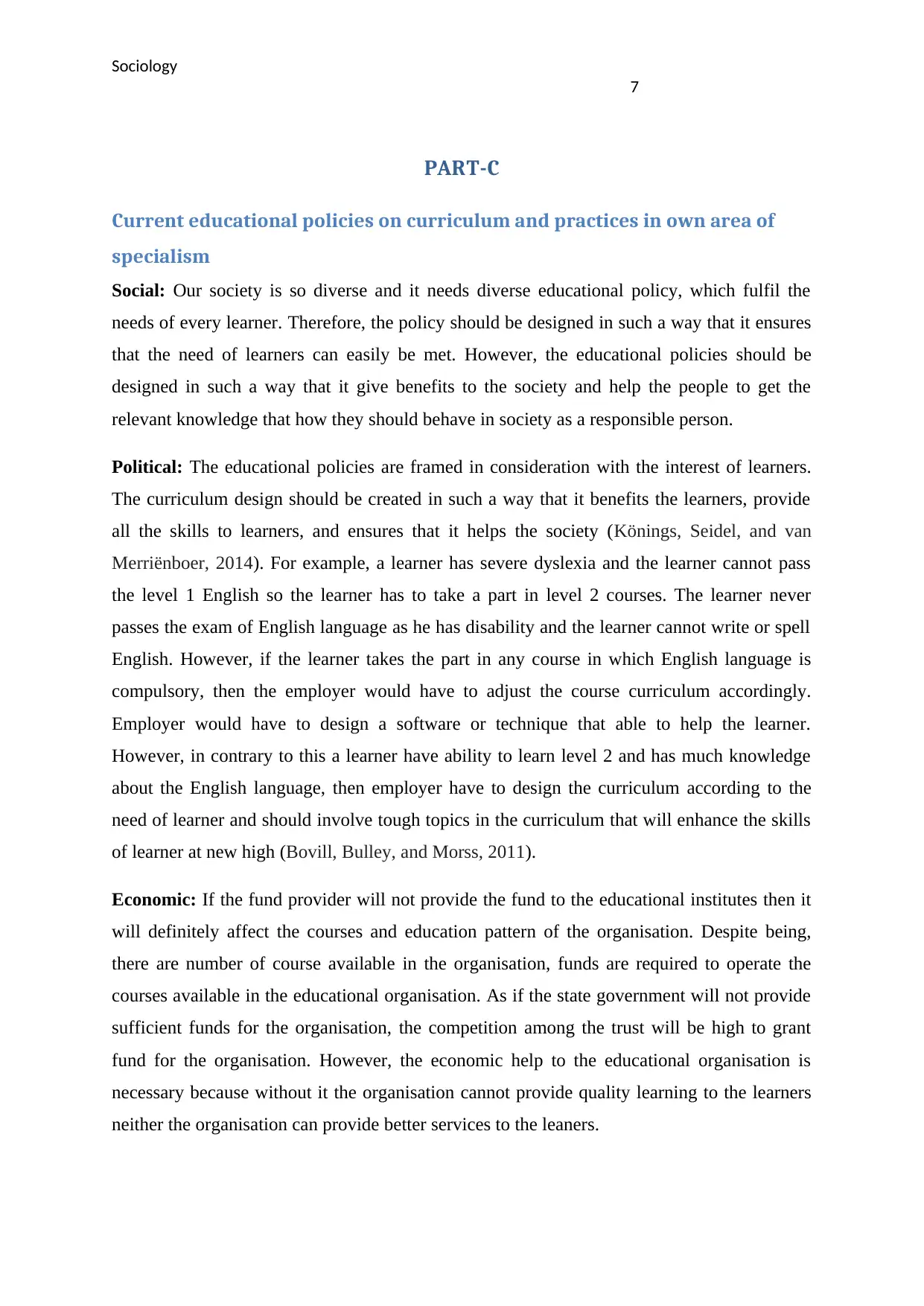
Sociology
7
PART-C
Current educational policies on curriculum and practices in own area of
specialism
Social: Our society is so diverse and it needs diverse educational policy, which fulfil the
needs of every learner. Therefore, the policy should be designed in such a way that it ensures
that the need of learners can easily be met. However, the educational policies should be
designed in such a way that it give benefits to the society and help the people to get the
relevant knowledge that how they should behave in society as a responsible person.
Political: The educational policies are framed in consideration with the interest of learners.
The curriculum design should be created in such a way that it benefits the learners, provide
all the skills to learners, and ensures that it helps the society (Könings, Seidel, and van
Merriënboer, 2014). For example, a learner has severe dyslexia and the learner cannot pass
the level 1 English so the learner has to take a part in level 2 courses. The learner never
passes the exam of English language as he has disability and the learner cannot write or spell
English. However, if the learner takes the part in any course in which English language is
compulsory, then the employer would have to adjust the course curriculum accordingly.
Employer would have to design a software or technique that able to help the learner.
However, in contrary to this a learner have ability to learn level 2 and has much knowledge
about the English language, then employer have to design the curriculum according to the
need of learner and should involve tough topics in the curriculum that will enhance the skills
of learner at new high (Bovill, Bulley, and Morss, 2011).
Economic: If the fund provider will not provide the fund to the educational institutes then it
will definitely affect the courses and education pattern of the organisation. Despite being,
there are number of course available in the organisation, funds are required to operate the
courses available in the educational organisation. As if the state government will not provide
sufficient funds for the organisation, the competition among the trust will be high to grant
fund for the organisation. However, the economic help to the educational organisation is
necessary because without it the organisation cannot provide quality learning to the learners
neither the organisation can provide better services to the leaners.
7
PART-C
Current educational policies on curriculum and practices in own area of
specialism
Social: Our society is so diverse and it needs diverse educational policy, which fulfil the
needs of every learner. Therefore, the policy should be designed in such a way that it ensures
that the need of learners can easily be met. However, the educational policies should be
designed in such a way that it give benefits to the society and help the people to get the
relevant knowledge that how they should behave in society as a responsible person.
Political: The educational policies are framed in consideration with the interest of learners.
The curriculum design should be created in such a way that it benefits the learners, provide
all the skills to learners, and ensures that it helps the society (Könings, Seidel, and van
Merriënboer, 2014). For example, a learner has severe dyslexia and the learner cannot pass
the level 1 English so the learner has to take a part in level 2 courses. The learner never
passes the exam of English language as he has disability and the learner cannot write or spell
English. However, if the learner takes the part in any course in which English language is
compulsory, then the employer would have to adjust the course curriculum accordingly.
Employer would have to design a software or technique that able to help the learner.
However, in contrary to this a learner have ability to learn level 2 and has much knowledge
about the English language, then employer have to design the curriculum according to the
need of learner and should involve tough topics in the curriculum that will enhance the skills
of learner at new high (Bovill, Bulley, and Morss, 2011).
Economic: If the fund provider will not provide the fund to the educational institutes then it
will definitely affect the courses and education pattern of the organisation. Despite being,
there are number of course available in the organisation, funds are required to operate the
courses available in the educational organisation. As if the state government will not provide
sufficient funds for the organisation, the competition among the trust will be high to grant
fund for the organisation. However, the economic help to the educational organisation is
necessary because without it the organisation cannot provide quality learning to the learners
neither the organisation can provide better services to the leaners.
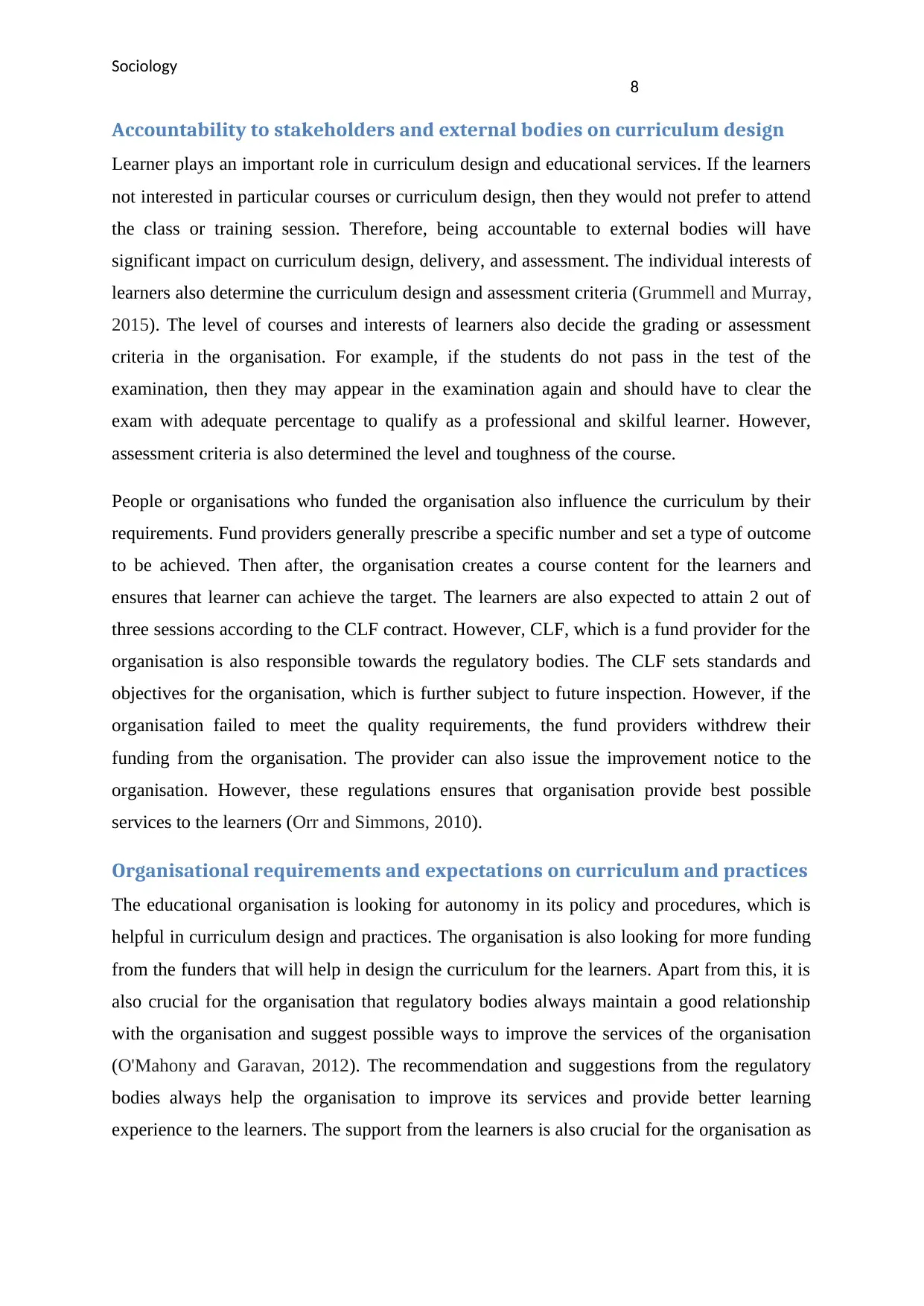
Sociology
8
Accountability to stakeholders and external bodies on curriculum design
Learner plays an important role in curriculum design and educational services. If the learners
not interested in particular courses or curriculum design, then they would not prefer to attend
the class or training session. Therefore, being accountable to external bodies will have
significant impact on curriculum design, delivery, and assessment. The individual interests of
learners also determine the curriculum design and assessment criteria (Grummell and Murray,
2015). The level of courses and interests of learners also decide the grading or assessment
criteria in the organisation. For example, if the students do not pass in the test of the
examination, then they may appear in the examination again and should have to clear the
exam with adequate percentage to qualify as a professional and skilful learner. However,
assessment criteria is also determined the level and toughness of the course.
People or organisations who funded the organisation also influence the curriculum by their
requirements. Fund providers generally prescribe a specific number and set a type of outcome
to be achieved. Then after, the organisation creates a course content for the learners and
ensures that learner can achieve the target. The learners are also expected to attain 2 out of
three sessions according to the CLF contract. However, CLF, which is a fund provider for the
organisation is also responsible towards the regulatory bodies. The CLF sets standards and
objectives for the organisation, which is further subject to future inspection. However, if the
organisation failed to meet the quality requirements, the fund providers withdrew their
funding from the organisation. The provider can also issue the improvement notice to the
organisation. However, these regulations ensures that organisation provide best possible
services to the learners (Orr and Simmons, 2010).
Organisational requirements and expectations on curriculum and practices
The educational organisation is looking for autonomy in its policy and procedures, which is
helpful in curriculum design and practices. The organisation is also looking for more funding
from the funders that will help in design the curriculum for the learners. Apart from this, it is
also crucial for the organisation that regulatory bodies always maintain a good relationship
with the organisation and suggest possible ways to improve the services of the organisation
(O'Mahony and Garavan, 2012). The recommendation and suggestions from the regulatory
bodies always help the organisation to improve its services and provide better learning
experience to the learners. The support from the learners is also crucial for the organisation as
8
Accountability to stakeholders and external bodies on curriculum design
Learner plays an important role in curriculum design and educational services. If the learners
not interested in particular courses or curriculum design, then they would not prefer to attend
the class or training session. Therefore, being accountable to external bodies will have
significant impact on curriculum design, delivery, and assessment. The individual interests of
learners also determine the curriculum design and assessment criteria (Grummell and Murray,
2015). The level of courses and interests of learners also decide the grading or assessment
criteria in the organisation. For example, if the students do not pass in the test of the
examination, then they may appear in the examination again and should have to clear the
exam with adequate percentage to qualify as a professional and skilful learner. However,
assessment criteria is also determined the level and toughness of the course.
People or organisations who funded the organisation also influence the curriculum by their
requirements. Fund providers generally prescribe a specific number and set a type of outcome
to be achieved. Then after, the organisation creates a course content for the learners and
ensures that learner can achieve the target. The learners are also expected to attain 2 out of
three sessions according to the CLF contract. However, CLF, which is a fund provider for the
organisation is also responsible towards the regulatory bodies. The CLF sets standards and
objectives for the organisation, which is further subject to future inspection. However, if the
organisation failed to meet the quality requirements, the fund providers withdrew their
funding from the organisation. The provider can also issue the improvement notice to the
organisation. However, these regulations ensures that organisation provide best possible
services to the learners (Orr and Simmons, 2010).
Organisational requirements and expectations on curriculum and practices
The educational organisation is looking for autonomy in its policy and procedures, which is
helpful in curriculum design and practices. The organisation is also looking for more funding
from the funders that will help in design the curriculum for the learners. Apart from this, it is
also crucial for the organisation that regulatory bodies always maintain a good relationship
with the organisation and suggest possible ways to improve the services of the organisation
(O'Mahony and Garavan, 2012). The recommendation and suggestions from the regulatory
bodies always help the organisation to improve its services and provide better learning
experience to the learners. The support from the learners is also crucial for the organisation as
⊘ This is a preview!⊘
Do you want full access?
Subscribe today to unlock all pages.

Trusted by 1+ million students worldwide
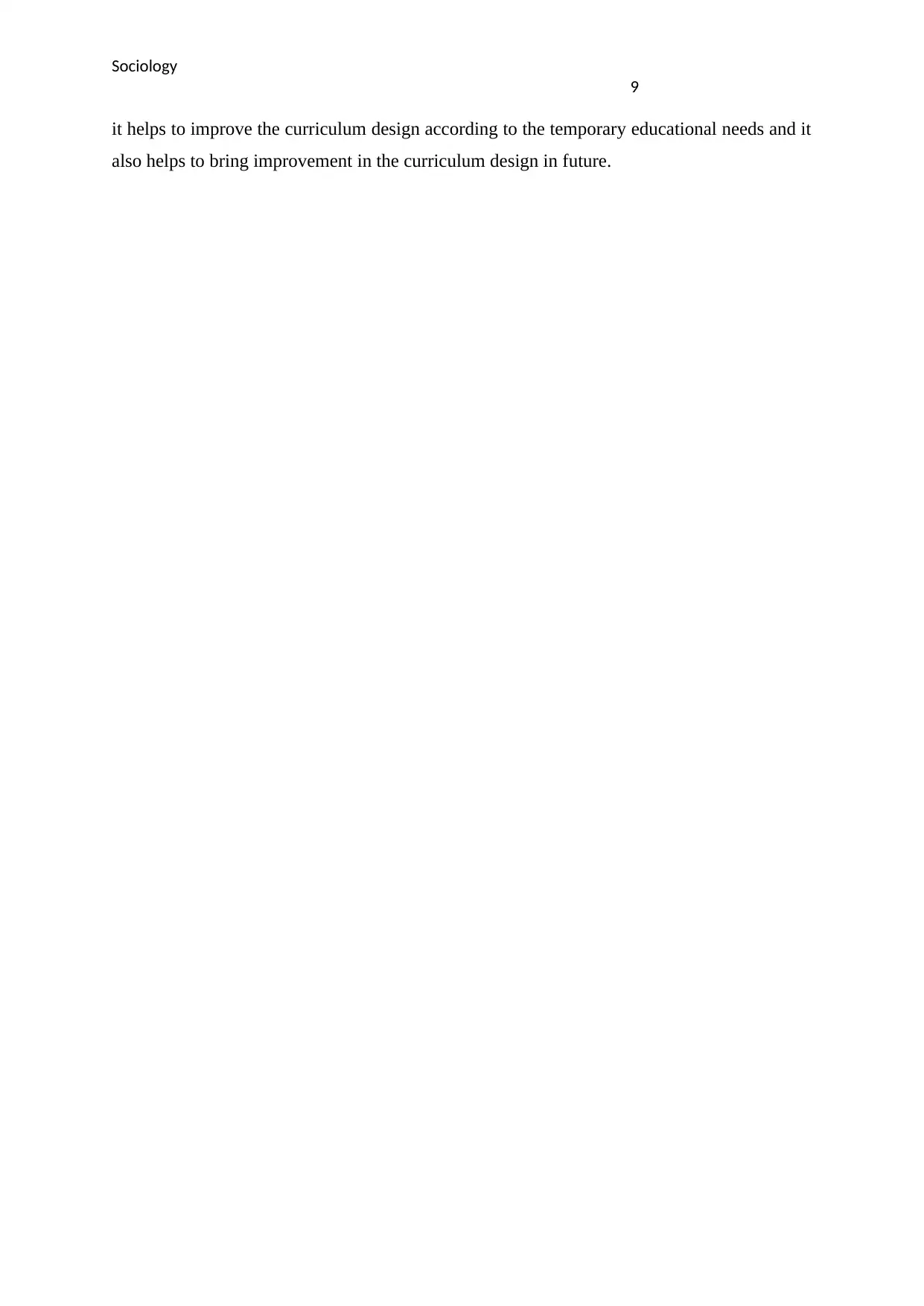
Sociology
9
it helps to improve the curriculum design according to the temporary educational needs and it
also helps to bring improvement in the curriculum design in future.
9
it helps to improve the curriculum design according to the temporary educational needs and it
also helps to bring improvement in the curriculum design in future.
Paraphrase This Document
Need a fresh take? Get an instant paraphrase of this document with our AI Paraphraser
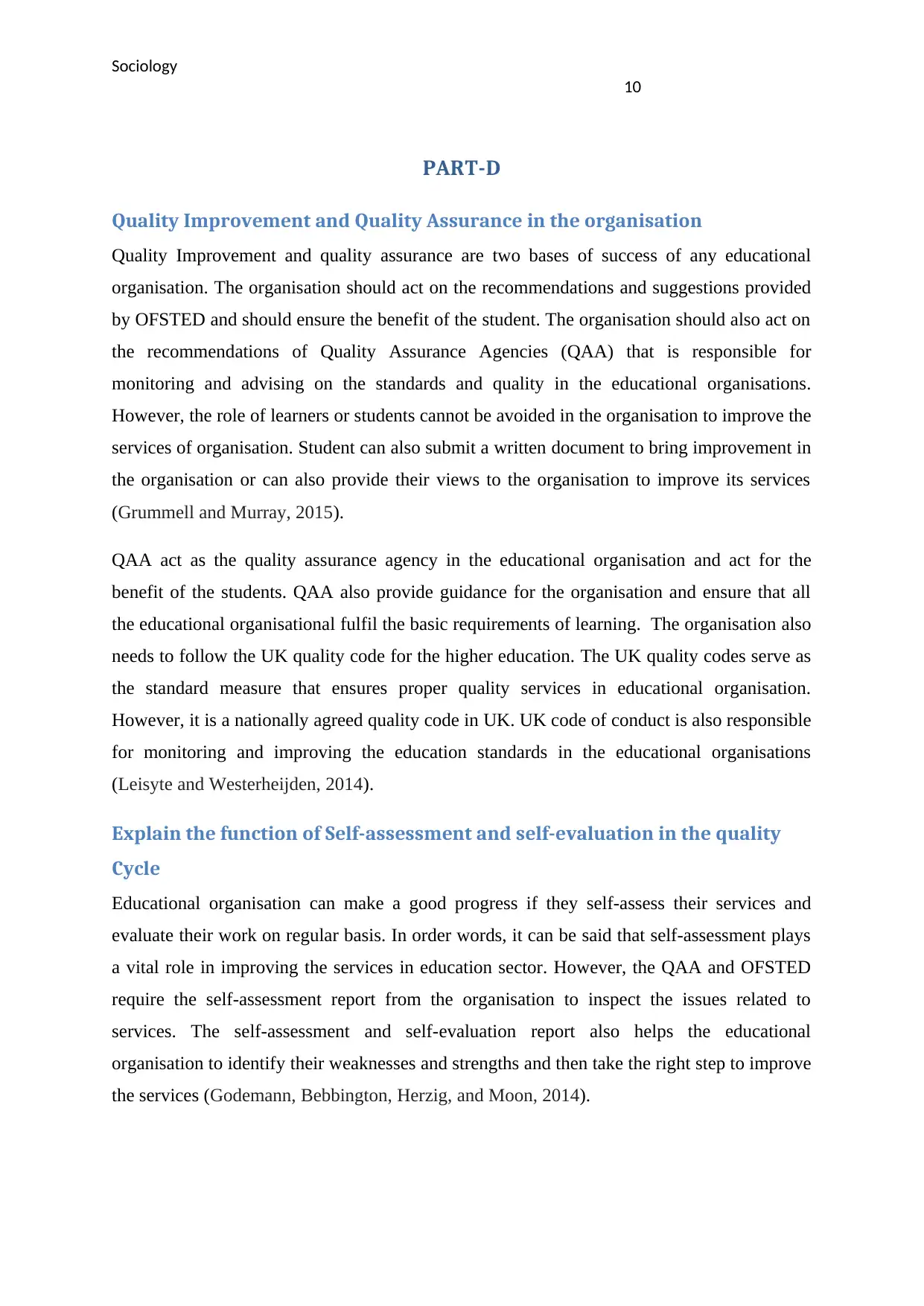
Sociology
10
PART-D
Quality Improvement and Quality Assurance in the organisation
Quality Improvement and quality assurance are two bases of success of any educational
organisation. The organisation should act on the recommendations and suggestions provided
by OFSTED and should ensure the benefit of the student. The organisation should also act on
the recommendations of Quality Assurance Agencies (QAA) that is responsible for
monitoring and advising on the standards and quality in the educational organisations.
However, the role of learners or students cannot be avoided in the organisation to improve the
services of organisation. Student can also submit a written document to bring improvement in
the organisation or can also provide their views to the organisation to improve its services
(Grummell and Murray, 2015).
QAA act as the quality assurance agency in the educational organisation and act for the
benefit of the students. QAA also provide guidance for the organisation and ensure that all
the educational organisational fulfil the basic requirements of learning. The organisation also
needs to follow the UK quality code for the higher education. The UK quality codes serve as
the standard measure that ensures proper quality services in educational organisation.
However, it is a nationally agreed quality code in UK. UK code of conduct is also responsible
for monitoring and improving the education standards in the educational organisations
(Leisyte and Westerheijden, 2014).
Explain the function of Self-assessment and self-evaluation in the quality
Cycle
Educational organisation can make a good progress if they self-assess their services and
evaluate their work on regular basis. In order words, it can be said that self-assessment plays
a vital role in improving the services in education sector. However, the QAA and OFSTED
require the self-assessment report from the organisation to inspect the issues related to
services. The self-assessment and self-evaluation report also helps the educational
organisation to identify their weaknesses and strengths and then take the right step to improve
the services (Godemann, Bebbington, Herzig, and Moon, 2014).
10
PART-D
Quality Improvement and Quality Assurance in the organisation
Quality Improvement and quality assurance are two bases of success of any educational
organisation. The organisation should act on the recommendations and suggestions provided
by OFSTED and should ensure the benefit of the student. The organisation should also act on
the recommendations of Quality Assurance Agencies (QAA) that is responsible for
monitoring and advising on the standards and quality in the educational organisations.
However, the role of learners or students cannot be avoided in the organisation to improve the
services of organisation. Student can also submit a written document to bring improvement in
the organisation or can also provide their views to the organisation to improve its services
(Grummell and Murray, 2015).
QAA act as the quality assurance agency in the educational organisation and act for the
benefit of the students. QAA also provide guidance for the organisation and ensure that all
the educational organisational fulfil the basic requirements of learning. The organisation also
needs to follow the UK quality code for the higher education. The UK quality codes serve as
the standard measure that ensures proper quality services in educational organisation.
However, it is a nationally agreed quality code in UK. UK code of conduct is also responsible
for monitoring and improving the education standards in the educational organisations
(Leisyte and Westerheijden, 2014).
Explain the function of Self-assessment and self-evaluation in the quality
Cycle
Educational organisation can make a good progress if they self-assess their services and
evaluate their work on regular basis. In order words, it can be said that self-assessment plays
a vital role in improving the services in education sector. However, the QAA and OFSTED
require the self-assessment report from the organisation to inspect the issues related to
services. The self-assessment and self-evaluation report also helps the educational
organisation to identify their weaknesses and strengths and then take the right step to improve
the services (Godemann, Bebbington, Herzig, and Moon, 2014).
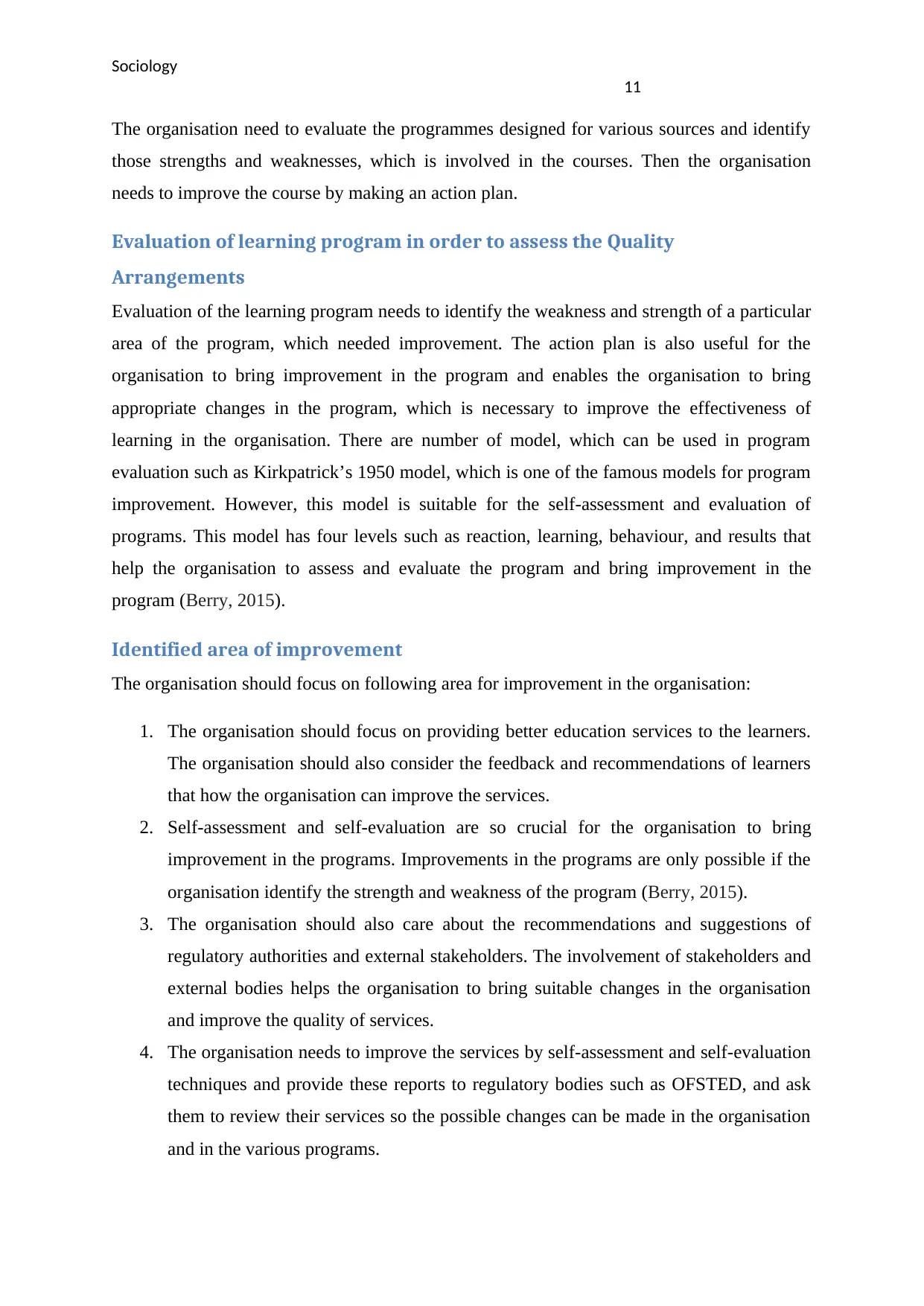
Sociology
11
The organisation need to evaluate the programmes designed for various sources and identify
those strengths and weaknesses, which is involved in the courses. Then the organisation
needs to improve the course by making an action plan.
Evaluation of learning program in order to assess the Quality
Arrangements
Evaluation of the learning program needs to identify the weakness and strength of a particular
area of the program, which needed improvement. The action plan is also useful for the
organisation to bring improvement in the program and enables the organisation to bring
appropriate changes in the program, which is necessary to improve the effectiveness of
learning in the organisation. There are number of model, which can be used in program
evaluation such as Kirkpatrick’s 1950 model, which is one of the famous models for program
improvement. However, this model is suitable for the self-assessment and evaluation of
programs. This model has four levels such as reaction, learning, behaviour, and results that
help the organisation to assess and evaluate the program and bring improvement in the
program (Berry, 2015).
Identified area of improvement
The organisation should focus on following area for improvement in the organisation:
1. The organisation should focus on providing better education services to the learners.
The organisation should also consider the feedback and recommendations of learners
that how the organisation can improve the services.
2. Self-assessment and self-evaluation are so crucial for the organisation to bring
improvement in the programs. Improvements in the programs are only possible if the
organisation identify the strength and weakness of the program (Berry, 2015).
3. The organisation should also care about the recommendations and suggestions of
regulatory authorities and external stakeholders. The involvement of stakeholders and
external bodies helps the organisation to bring suitable changes in the organisation
and improve the quality of services.
4. The organisation needs to improve the services by self-assessment and self-evaluation
techniques and provide these reports to regulatory bodies such as OFSTED, and ask
them to review their services so the possible changes can be made in the organisation
and in the various programs.
11
The organisation need to evaluate the programmes designed for various sources and identify
those strengths and weaknesses, which is involved in the courses. Then the organisation
needs to improve the course by making an action plan.
Evaluation of learning program in order to assess the Quality
Arrangements
Evaluation of the learning program needs to identify the weakness and strength of a particular
area of the program, which needed improvement. The action plan is also useful for the
organisation to bring improvement in the program and enables the organisation to bring
appropriate changes in the program, which is necessary to improve the effectiveness of
learning in the organisation. There are number of model, which can be used in program
evaluation such as Kirkpatrick’s 1950 model, which is one of the famous models for program
improvement. However, this model is suitable for the self-assessment and evaluation of
programs. This model has four levels such as reaction, learning, behaviour, and results that
help the organisation to assess and evaluate the program and bring improvement in the
program (Berry, 2015).
Identified area of improvement
The organisation should focus on following area for improvement in the organisation:
1. The organisation should focus on providing better education services to the learners.
The organisation should also consider the feedback and recommendations of learners
that how the organisation can improve the services.
2. Self-assessment and self-evaluation are so crucial for the organisation to bring
improvement in the programs. Improvements in the programs are only possible if the
organisation identify the strength and weakness of the program (Berry, 2015).
3. The organisation should also care about the recommendations and suggestions of
regulatory authorities and external stakeholders. The involvement of stakeholders and
external bodies helps the organisation to bring suitable changes in the organisation
and improve the quality of services.
4. The organisation needs to improve the services by self-assessment and self-evaluation
techniques and provide these reports to regulatory bodies such as OFSTED, and ask
them to review their services so the possible changes can be made in the organisation
and in the various programs.
⊘ This is a preview!⊘
Do you want full access?
Subscribe today to unlock all pages.

Trusted by 1+ million students worldwide
1 out of 16
Related Documents
Your All-in-One AI-Powered Toolkit for Academic Success.
+13062052269
info@desklib.com
Available 24*7 on WhatsApp / Email
![[object Object]](/_next/static/media/star-bottom.7253800d.svg)
Unlock your academic potential
Copyright © 2020–2026 A2Z Services. All Rights Reserved. Developed and managed by ZUCOL.





